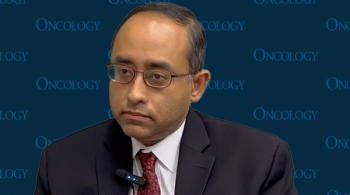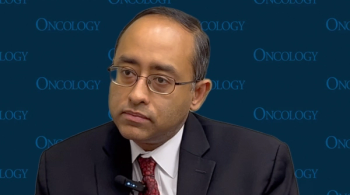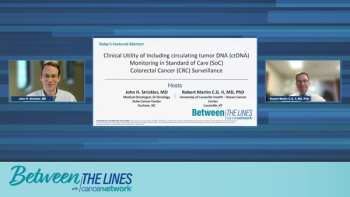
There are 4 JAK inhibitors approved for myelofibrosis, all of which are usable in certain situations depending on a patient’s clinical factors.

Your AI-Trained Oncology Knowledge Connection!


There are 4 JAK inhibitors approved for myelofibrosis, all of which are usable in certain situations depending on a patient’s clinical factors.

Experts highlight methods for optimally treating patients with genitourinary cancers harboring variant histologies at World GU 2025.

Interferons and other anemia-driven therapies for myelofibrosis are exciting for the future, according to Prithviraj Bose, MD.

Experts discuss how ctDNA dynamics after colorectal cancer surgery can guide personalized surveillance and treatment, with recurrent positivity signaling high relapse risk and potential therapy resistance, whereas sustained negativity may support less intensive monitoring, balancing effective oversight with patient quality of life.

In community settings, offices may have to send pathology specimens to reference labs, and it may be difficult to maintain effective communication.

Experts discuss pooled data from international studies demonstrating the strong prognostic value of ctDNA monitoring in colorectal cancer surveillance, highlighting its ability to detect minimal residual disease and guide treatment decisions across diverse patient populations despite geographic differences in chemotherapy use.

Morphological dysplasia is the cornerstone of making a myelodysplastic syndrome diagnosis, except for a few myelodysplastic syndrome–defining genetic alterations.

Sundar Jagannath, MBBS, said that when a cure is defined for patients with multiple myeloma, specific patients may be able to stop therapy without a risk of relapsing.

Panelists discuss how CheckMate 9ER results demonstrated significant progression-free survival and overall survival benefits with nivolumab plus cabozantinib vs sunitinib, with particularly impressive HRs for patients with visceral disease, including liver, bone, and lung metastases.

Panelists discuss how the KEYNOTE-426 trial established pembrolizumab plus axitinib as an effective and well-tolerated immunotherapy-tyrosine kinase inhibitor (IO-TKI) combination with high response rates and unprecedented tumor control, particularly suitable for frail patients due to axitinib's selective targeting and short half-life.

An expert explains that bispecific antibodies, currently approved for heavily pretreated multiple myeloma patients, are poised for earlier use—including maintenance and frontline settings—with ongoing research focused on safely stopping therapy after sustained minimal residual disease negativity to personalize treatment and improve long-term outcomes.

Results from the phase 1b/2 CARTITUDE-1 trial showed that after patients receiving cilta-cel were disease-free for 5 years, they did not need maintenance therapy.

Hydration and a healthy, well-balanced diet may mitigate fatigue among patients undergoing treatment for cancer.

The medical characteristics of a patient may heavily factor into the selection of tyrosine kinase inhibition for the treatment of chronic myeloid leukemia.

Bland foods, such as crackers and chicken noodle soup, as well as fluids with electrolytes may help stave off treatment-related nausea.

The toxicity profile of interferon and the limited availability of transplantation established a need for TKI development for chronic myeloid leukemia.

The approach to treating patients with multiple myeloma will change for physicians, pharmaceutical companies, and even patients themselves.

Predictors of response have a significant effect on clinical decision-making because they may help oncologists select the best treatment for specific patients.

Panelists discuss the challenges of managing intermediate-risk metastatic clear cell renal cell carcinoma (ccRCC) after progression on first-line immunotherapy (IO)/tyrosine kinase inhibitor (TKI) therapy, emphasizing cabozantinib’s role, individualized dosing strategies, proactive toxicity management, and the importance of patient-centered care to optimize long-term disease control and quality of life.

According to Denise B. Reynolds, RD, patients eating well should not be experiencing nutritional deficiencies during cancer treatment.

Panelists discuss evolving second-line treatment strategies for clear cell renal cell carcinoma (ccRCC), emphasizing the impact of first-line regimens, the growing role of tyrosine kinase inhibitors (TKIs) and emerging combinations, and the need for clinical judgment in sequencing therapies to balance disease control, symptom management, and patient quality of life.

Delaying treatment with ruxolitinib by more than a year leads to decreased response rates and overall survival in patients with myelofibrosis.

Experts discuss the critical role of clear pathology communication and risk assessment after colorectal cancer surgery, highlighting how surgical quality, pathologic staging, and timely ctDNA testing guide personalized adjuvant therapy decisions and coordinated long-term surveillance to optimize patient outcomes.

Panelists discuss how future directions in multiple myeloma include exciting developments like bispecific T-cell engagers (BiTEs) targeting B-cell maturation antigen (BCMA) and GPRC5D, dual-target chimeric antigen receptor (CAR) T therapies, and revolutionary in vivo CAR T approaches, while emphasizing the importance of nurse education and advocacy, compassionate patient-centered care, and a collaborative community approach where academic centers support community oncologists through accessible communication and shared care, ultimately working toward the goal of curing more patients, as evidenced by one-third of ciltacabtagene autoleucel (cilta-cel) recipients remaining in remission 5 years later without additional therapy.

Panelists discuss how comprehensive post–chimeric antigen receptor (CAR) T follow-up care includes proactive immune system support through IVIG (intravenous immunoglobulin) therapy that rapidly improves immune function within days, resulting in patients achieving complete remission with undetectable light chains, eliminated M spike, negative bone marrow for plasma cells, and minimal residual disease (MRD)-negative status, representing the deepest possible remission, while patients report significantly improved quality of life with better stamina, ability to work in their yards, and freedom from daily chemotherapy compared with traditional treatments, with many describing CAR T as “a walk in the park” compared with stem cell transplant and emphasizing their desire to be healed rather than continuously harmed by ongoing chemotherapy regimens.

Experts discuss the expanding role of ctDNA as a prognostic and predictive tool in colorectal cancer management, emphasizing its ability to personalize postoperative surveillance and treatment decisions—particularly in ambiguous clinical scenarios—while highlighting the need for sensitive assays and thoughtful communication around emotionally challenging results.

The most common toxicity associated with TAS-102 was neutropenia, with grade 3 events occurring in 73.3% of patients with colorectal cancer.

Blood-based markers of note in kidney cancer prognosis include circulating tumor DNA and proteomic markers, according to Michael B. Atkins, MD.

“…I like TAS-102 as an agent, but we need better drugs than we have right now to clear ctDNA and cure patients,” said Hornstein, MD, PhD.

An expert highlights that outpatient step-up dosing of bispecific antibody therapy in multiple myeloma is feasible and beneficial for selected patients—with criteria like caregiver support, proximity to care, and low disease burden—supported by prophylactic measures and close monitoring to ensure safety while improving patient comfort and reducing health care costs.